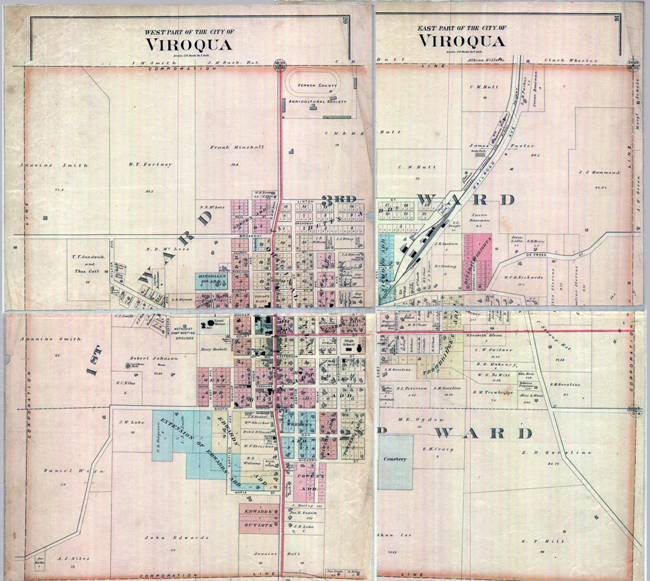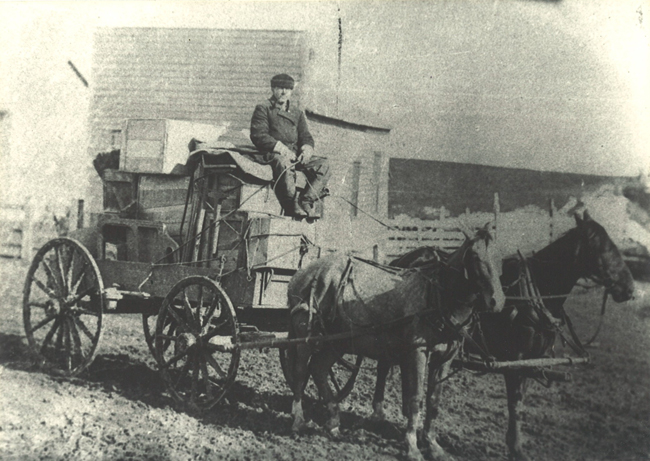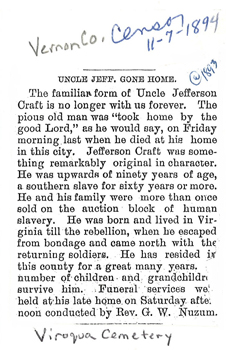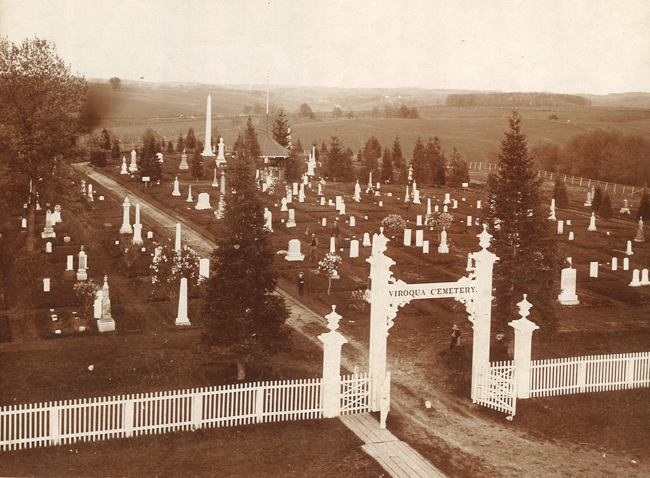Local History Topics
Cheyenne Valley
Museum Notes
by Kristen Parrott, curator
for the week of February 11-17, 2018
In 1964, at the height of the Civil Rights movement, local historian Myrtle Wolfgram wrote an article for the Vernon County Broadcaster entitled, “City Respected Lamplighter Negro, Family 70 Years Ago.” The article is about Jefferson Craft, his wife Lottie, and their children, who were the first and, as of 1964, the last African-American family to have lived in Viroqua. Today the city is more diverse, but in 1964, a black family was news.
Last week we looked at the Craft family’s life in Cheyenne Valley in the 1870’s and 1880’s. This week we’ll focus on their move to Viroqua. Before moving to the city, they appear to have visited several times. The first record of the Crafts visiting Viroqua is for the marriage ceremony of Jefferson and Lottie by the Vernon County judge in 1873.
The next reference I have found is a Vernon County Censor newspaper article printed a few days after July 4, 1885. A long article about the Independence Day celebration in Viroqua describes a parade which included “Mr. Jefferson Craft and family, the jubilee singers.” (The term “jubilee singers” might have been inspired by the world-renowned Jubilee Singers of Fisk University in Tennessee, a small choral group formed in 1871 to sing slave songs and spirituals. Perhaps the Craft family sang similar music.) This article is followed by another devoted to Jefferson, who is said to be “living comfortably on a farm owned by himself in the town of Forest, this county, surrounded by his family of six children.”
Frustratingly, we haven’t yet determined the year when the Craft family moved to Viroqua, but it was sometime in the late 1880’s. Myrtle Wolfgram’s 1964 article quotes a late 19th-century newspaper, but doesn’t give an exact date: “On Tuesday morning, Jeffry Craft, wife and four children, Ben, Florence, Susie and Minnie moved into Viroqua, becoming the city’s first Negro resident family. They occupy a tenement house on North Main Street and the children have entered the Viroqua Public Schools.”

1896 plat of the City of Viroqua
No reason is given for this move. Their previous home of Cheyenne Valley was one of the largest rural African-American communities in Wisconsin at that time, and Viroqua was – not. Perhaps Jefferson Craft had retired from full-time farming but still needed an income to feed his young family. Sources differ on Jefferson’s age, but he was probably at least in his 70’s by this time. Or maybe some conflict drove them from their long-time home.
Wolfgram tells us that Jefferson Craft worked with the horses at Frank Minshall’s draybarn in Viroqua, which operated from 1879 to 1900, and on Minshall’s farm across from the county fairgrounds. Craft also worked as the city’s lamplighter – gaslamps were installed on Viroqua’s major thoroughfares in 1887, electricity arriving a few years later in 1892. As son Benjamin Craft grew old enough, he joined his father at these jobs.

Minshall's dray line, 1877
In the early 1890’s, several members of the family died, their deaths noted in the local newspaper. Five-year-old Delia died in 1890, mother Lottie in 1891, and father Jefferson in 1894. Jefferson Craft’s obituary described him as “something remarkably original in character… a southern slave for sixty years or more. He and his family were more than once sold on the auction block of human slavery… till the rebellion, when he escaped from bondage and came north with the returning soldiers.” His funeral was conducted at the Craft family’s home in Viroqua by the Rev. George Washington Nuzum, retired Methodist minister.

The obituary also notes that Jefferson was survived by a number of children and grandchildren. The only grandchild I have found a record for is Carrie Craft, born to Susie Craft in Viroqua in 1892. Carrie’s father’s name is not listed, just the word “illegitimate”. After Jefferson Craft’s death in 1894, the family seems to fade away, disappearing from record.

Reading Wolfgram’s 1964 article today, the word choices now tell their own story, of an all-white Viroqua that had “respected” the only African-American family that ever lived there. As the country experienced the social unrest of the 1960’s, the article seems to reassure readers that racial strife couldn’t happen here. The Craft family is described as poor but “willing and ready to work”. Their house was “well-kept” and their children were “well-mannered”. Viroqua was not segregated, and black and white children went to school together. It’s a very rosy picture. But, the Crafts were just one family, and they only lived in the city for a few years.
The museum would like to know more about the Crafts – contact us if you have any additional information.

 MENU
MENU